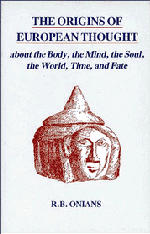Book contents
- Frontmatter
- Contents
- Preface to the first edition
- Preface to the second edition
- Introduction: The Earliest Greeks
- PART I THE MIND AND THE BODY
- PART II THE IMMORTAL SOUL AND THE BODY
- PART III FATE AND TIME
- Chapter I ‘On the Knees of the Gods’
- Chapter II Πείρατα
- Chapter III Καιρός
- Chapter IV The Weaving of Fate
- Chapter V Other Peoples—Fate and Magic
- Chapter VI Μοῖραν ἐπιτιθέναι, πεπρωμένος, etc.
- Chapter VII ʿΥπὲρ μόρον and the Relation of the Gods of Fate
- Chapter VIII The Jars of Zeus, the Scates of Zeus, and the Κῆρες
- Chapter IX Time—Ἦμαρ
- Chapter X Lachesis, Klotho, and Atropos
- Chapter XI Phases of Body and Mind, Sorrow, Sleep, Death, etc.
- Chapter XII Τέλος
- ADDENDA
- Indexes
- Frontmatter
- Contents
- Preface to the first edition
- Preface to the second edition
- Introduction: The Earliest Greeks
- PART I THE MIND AND THE BODY
- PART II THE IMMORTAL SOUL AND THE BODY
- PART III FATE AND TIME
- Chapter I ‘On the Knees of the Gods’
- Chapter II Πείρατα
- Chapter III Καιρός
- Chapter IV The Weaving of Fate
- Chapter V Other Peoples—Fate and Magic
- Chapter VI Μοῖραν ἐπιτιθέναι, πεπρωμένος, etc.
- Chapter VII ʿΥπὲρ μόρον and the Relation of the Gods of Fate
- Chapter VIII The Jars of Zeus, the Scates of Zeus, and the Κῆρες
- Chapter IX Time—Ἦμαρ
- Chapter X Lachesis, Klotho, and Atropos
- Chapter XI Phases of Body and Mind, Sorrow, Sleep, Death, etc.
- Chapter XII Τέλος
- ADDENDA
- Indexes
Summary
There has been one almost invariable feature in discussions of πεĩραρ, an endeavour to support the abstract meaning by citing parallel phrases with τέλος, the abstractness of τέλος itself never being questioned. It is, however, a word which puzzles philologists. Indeed to them it is not one word but several. Unable to harmonise and correlate the widely varied meanings, they are driven to assume more than one original. Boisacq, for instance, distinguishes three originally distinct words (related to three different words or groups of words in various Indo-European languages) meaning (1) ‘end’, (2) ‘troop’, and (3) ‘payment’; and these are but the central points of three series of meanings. It was the first of these which was called in to throw light on πεĩραρ. Πολέμου τέλος and τέλος θανάτοιο have been quoted to show that ἔριδος… καὶ…πτολέμοιο πεĩραρ and ὀλέθρου πείρατα mean respectively ‘the issue of war’ and ‘utter destruction’, which we have seen they do not. Indeed such abstract and periphrastic expressions are far to seek in Homer.
We have already seen that Priam's remark about the impending duel between Paris and Menelaos: ‘Zeus knows this and the other gods, for which of the two the τέλος of death is πεπρωμένονʾ, probably involves the image of fate, death, as a band or bond. Another formula deserves attention.
- Type
- Chapter
- Information
- The Origins of European ThoughtAbout the Body, the Mind, the Soul, the World, Time and Fate, pp. 426 - 466Publisher: Cambridge University PressPrint publication year: 1988



